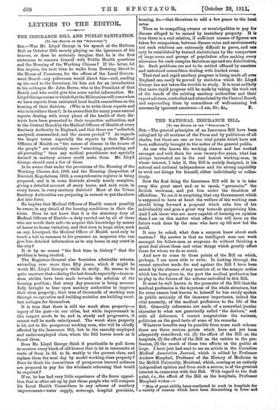LETTERS TO THE EDITOR.
THE INSURANCE BILL AND PUBLIC SANITATION.
[To TIM EDITOR OF THE "SPECTATOR."] .SIR,—Was Mr. Lloyd George in his speech at the Holborn Hall on October 20th merely playing on the ignorance of his hearers, or does he seriously imagine that he is the first statesman to concern himself with Public Health questions and the Housing of the Working Classes If the latter, let him inquire, the next time he walks from Downing Street to the House of Commons, for the offices of the Local Govern- ment Board—any policeman would direct him—and, sending up his card to the Secretary, let him ask for an introduction to his colleague Mr. John Burns, who is the President of that Board, and who could give him some useful information. Mr. Lloyd George seems to think that the Millennium will come when we have reports from untrained local health committees on the housing of their districts. (Who is to write these reports and who is to collate them ?) Is he aware that for many years annual reports dealing with every phase of the health of their dis- tricts have been presented to their respective authorities, and to the Central Board by the Medical Officers of Health of every Sanitary Authority in England, and that these are "collected, analysed, summarized, and the causes probed " ? As regards the larger towns especially the reports by their Medical Officers of Health on " the causes of disease in the homes of the people" are certainly more "searching, penetrating, and all-pervading " than any medical practitioner not specially trained in sanitary science could make them. Mr. Lloyd George should read a few of these.
Is be aware that under the provisions of the Housing of the Working Classes Act, 1909, and the Housing (Inspection of District) Regulations, 1910, a comprehensive register is being prepared, and is in some districts already nearly complete, giving a detailed account of every house, and each room in every house, in every sanitary district? Most of the Urban Sanitary Authorities are preparing in earnest to put the above Act into force.
He implies that Medical Officers of Health cannot possibly be aware in any detail of the housing conditions in their dis- tricts. Does he not know that it is the statutory duty of Medical Officers of Health—a duty carried out by all of them who are worth their salt—to acquire this knowledge by means of house-to-house visitation, and that even in large cities, such as, say, Liverpool, the Medical Officer of Health need only to touch a bell to summon to his presence an inspector who can give him detailed information as to any house in any court in the city ?
It is by no means "the first time in history" that the problem is being studied.
The Registrar-General also furnishes admirable returns, extending over more than fifty years, which it might be worth Mr. Lloyd George's while to study. He seems to be quite unaware that—during the last decade especially—tremen- dous strides have been made towards the solution of the housing problem ; that every day pressure is being success- fully brought to bear upon sanitary authorities to improve their slum property ; that tens of thousands of working men through co-operative and building societies are building excel- lent cottages for themselves.
It is true that there is still too much slum property—a legacy of the past—in our cities, but while improvement in this respect needs to be, and is, steady and progressive, it cannot well be made cataclysmal. The worst slum property is let, not to the prosperous working man, who will be chiefly affected by the Insurance Bill, but to the casually employed and under-employed class, whom the Bill leaves much as it found them.
Does Mr. Lloyd George think it practicable to pull down to-morrow every block of old houses that is let in tenements at rents of from ls. 6d. to 2s. weekly to the poorest class, and replace them the next day by model working-class property P Does he think his committees of prosperous insured artisans are prepared to pay for the wholesale rehousing that would be required ?
If so, he has had very little experience of the fierce opposi- tion that is often set up by just those people who will compose his Local Health Committees to any scheme of sanitary improvement—water supply, sewerage, hospital provision,
housing, &c.—that threatens to add a few pence to the local rates.
Then as to compelling owners or municipalities to pay for disease alleged to be caused by insanitary property. It it true there is a real relation, if sufficient masses of figures an taken for comparison, between disease rates and environment; but such relations are extremely difficult to prove, and can only be established by trained statisticians by the comparison of large areas and groups of population after making every allowance for such complex factors as age and sex distribution, &o. Such problems are not to be settled offhand by amateur and untrained committees dealing with limited areas.
That real and rapid sanitary progress is being made all over England can easily be proved by statistics which Mr. Lloyd George has not taken the trouble to study. It is most unlikely that more rapid progress will be made by taking the work out of the hands of the existing sanitary authorities and their expert advisers, controlled and stimulated by the Central Board, and superseding them by committees of well-meaning but necessarily ignorant amatenrs.—I am, Sir, &o., F.










































 Previous page
Previous page